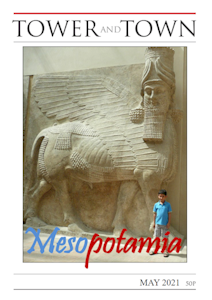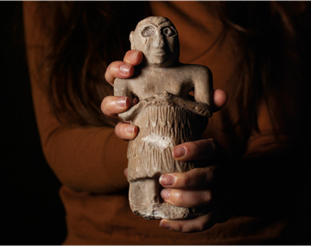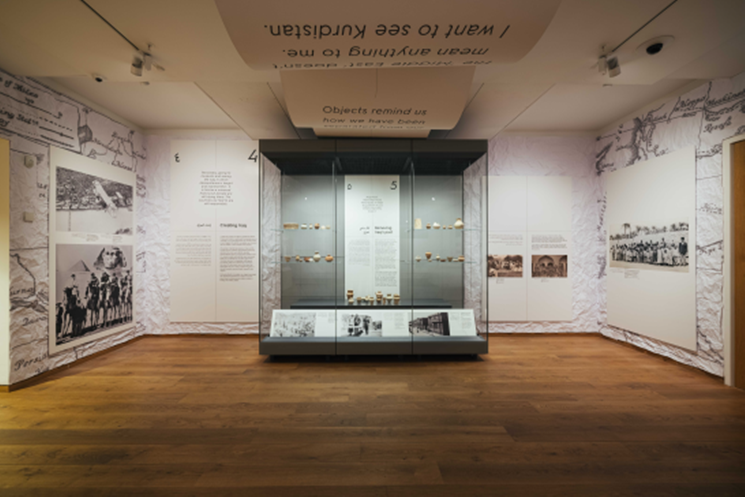

Tower and Town, May 2021 (view the full edition) (view the full edition)Owning The Past: From Mesopotamia To Iraq At The Ashmolean MuseumThe Ashmolean Museum at the University of Oxford is home to one of the UK's major collections from the Ancient Middle East. The material ranges from the earliest farming village communities like Jericho around 9000 BC, to cuneiform tablets such as the famous Sumerian King List (about 1800 BC) from Mesopotamia (modern Iraq), and stone fragments from Persepolis in Iran, centre of the great Achaemenid Persian Empire of the fifth century BC. These objects, along with many others, will be redisplayed as part of a refurbishment of the Museum's Ancient Middle East gallery, scheduled to open in June 2021. The new displays will focus on the lives of the ancient inhabitants of the region, providing context through the arrangement of objects with photographs and reconstructions.  A number of projects have taken place over the last few years to help develop and shape the narratives in the gallery. This includes a temporary exhibition called Owning the Past: From Mesopotamia to Iraq which explores the history of how ancient objects from Iraq came to the Ashmolean in more detail than will be possible in the permanent gallery. Crucially, it highlights the impact that these events have had and continue to have on the lives and identities of people from the Middle East. The approach is part of a museum-wide strategy designed to proactively address issues of equity and inclusion. Called 'Ashmolean for All', it aims to improve the way the Museum represents, works with, and includes diverse communities and individuals: existing visitors, potential visitors, staff, and volunteers. Part of this work involves rethinking our institutional history and the stories we tell in the galleries. The exhibition was inspired by the attempts of so-called Islamic State or Daesh to eradicate the borders of Iraq and the lives of many of its peoples in the years 2014-17. The Ashmolean seemed the perfect place to consider the origins of these borders, especially in the context of the region's archaeology and heritage, as a number of the Museum's employees and Oxford alumni were instrumental in their creation as well as the formation of the University's ancient Middle East collection. To explore the impact of these events on people in the region, we involved local members of the Syrian, Iraqi, and Kurdish diaspora, with the help of paid Community Ambassadors, in the development of the exhibition. Listening to their views about the events of 1914 to 1932 (when Iraq nominally gained independence from Britain), and what these meant to them as individuals as well as to their communities, we have sought to represent them in the exhibition. Together, in a series of workshops, we discussed whether archaeological objects were important in telling their stories and how their sense of identity and community has been maintained in a distant land. The exhibition is therefore an opportunity to highlight the long-lasting impact of the past on the present, explore what is meant by heritage, the role of museums, and introduce voices and stories of people not previously visible in displays devoted to the very histories and heritage of their homelands. To help make the exhibition as accessible as possible, it was decided that it should be dual language - Arabic and English. The exhibition concludes with reflections on Iraq's heritage today and questions who should be making decisions about it, not least the heritage that now lies outside Iraq's borders. We highlight the Nahrein Network https://www.ucl.ac.uk/nahrein/ as a successful model for helping to support Iraqi researchers in reclaiming their own heritage as local history, putting it to constructive use for their communities.   Owning the Past: From Mesopotamia to Iraq runs until 16 May 2021 (discussions are currently underway which may allow for an extension of the closing date): https://www.ashmolean.org/event/owning-the-past For a BBC report on the exhibition see: https://www.youtube.com/watch?v=jgM7k34L-JI Paul Collins, BA, MA, PhD is Jaleh Hearn Curator of Ancient Near East in the Department of Antiquities at the Ashmolean and is currently a Hugh Price Fellow at Jesus College and holds a supernumerary Fellowship at Wolfson College. He has worked previously as a curator in the Middle East Department of the British Museum and the Ancient Near Eastern Art Department of the Metropolitan Museum of Art, New York. He is currently Chair of the British Institute for the Study of Iraq. Paul Collin |